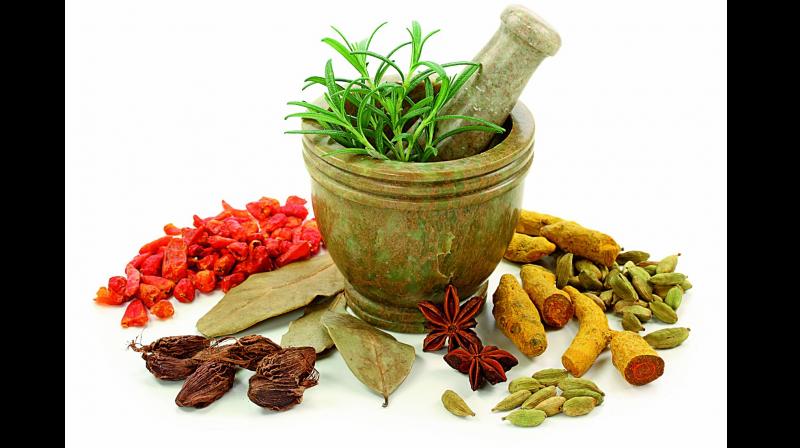Telangana: Traditional medicines gaining ground as awareness increases
On Thursday,100 medical camps were conducted across the state, leading up to the celebration of the National Ayurveda Day on October 17.;

Hyderabad: According to officials of the department of AYUSH, clinics and hospitals offering indigenous treatments are gaining popularity in the state.
Practitioners of Indian medicinal systems attribute this trend to the increasing awareness among the public regarding the efficacy of Unani, Ayurveda and Homeopathy.
Over the past few years, the number of indigenous dispensaries in the state has increased, with more funds being allocated for Indian medicine under schemes funded by the Union Ministry for AYUSH.
“We are planning to further increase the numbers of dispensaries for Ayurveda, Homeopathy and Unani medication in the state because of the encouraging response received from the public,” says A. Rajendra Reddy, the commissioner in-charge of the AYUSH department.
On Thursday,100 medical camps were conducted across the state, leading up to the celebration of the second National Ayurveda Day on October 17.
Dr Y. Janardhan Reddy, the superintendent in-charge of the Government Ayurveda Hospital, a 100-bedded hospital that was set up during the Nizam’s era, says that people from across the state come to the hospital seeking treatment for paralysis, diabetes, spondylosis and skin diseases.
“Some persons who are receiving modern medical treatment also try the ayurvedic medicine as there are no side effects,” he says. He adds that the number of outpatients treated at the hospital per day has increased from 200 to 250 over the past couple of years.
The government hospital has been receiving such an encouraging turnout because entrepreneurs have not shown an interest in starting private clinics as expenses are high and returns are low.
“You will not find a big, private hospital offering ayurveda, unani and homeopathy treatments. This is the reason why people from all classes visit government-managed hospitals,” says Dr Parveen, superintendent of the Government Nizamia Tibbi Hospital.
Nearly 700 people visit the hospital every day for outpatient consultation. Two years ago, this number was only 450.
Dr Venkat Ram Reddy, a medical officer at the Government Homeo Dispensary in Bowenpally, says that people who benefit from homeopathic treatment often recommend it to others as well. He says that the number of private homeopathic medical stores in the state have also increased drastically.
The only drawback of opting for indigenous medical regimes is that treatment can take a long time. “If an ailment is life-threatening or if it requires immediate resolution, we ourselves advise people to approach hospitals offering modern medical treatments.
“Our hospitals are not fully equipped to handle such cases,” says Dr Saleemuddin, president of the Telangana State Medical Officers Association.
Rising numbers
Traditional medicine hospitals
4 Ayurveda
3 Homoeopathy
3 Unani
1 Naturopathy
Dispensaries
224 Ayurveda
122 Unani
94 Homoeopathy
Dispensaries under National Rural Health Mission (NRHM)
199 Ayurveda
62 Unani
105 Homoeopathy
28 Naturopathy
With no drug assessors, pharmacies make hay
The department of AYUSH has claimed that traditional medicines were fast catching up but has failed to fill up the post of drug inspector who check shops selling the medicines.
The state does not have a single drug inspector for homoeopathy; the post fell vacant after bifurcation, said an official.
There were three posts of drug inspector for Ayurveda and two for Unani. After the bifurcation, the state is left with one drug inspector each for ayurveda and unani.
“Ayurveda, unani and homoeopathy are different, it is impossible for a drug inspector to inspect all the medical stores,” said a drug inspector.
With the number of private clinics offering traditional medicines having gone up, new pharmacies have come up and are being run without licences.
A drug inspector said, “We come to know of such pharmacies when the police or locals approach us with a complaint.”
The drug inspectors have to not only check the records and stocks at the pharmacies but they also have to collect samples and send them to the laboratories for analysis. Due to the shortage of staff, this is presently not being done.
Mr A. Rajendar Reddy, incharge commissioner, AYUSH, said the department had informed the government of the situation, and the posts would be filled up soon.
“We are also writing to the government to increase the number of posts of drug inspectors to effectively check fraudulent pharmaciies. Recruitments will be done through Telangana Public Service Commission,” he said.

